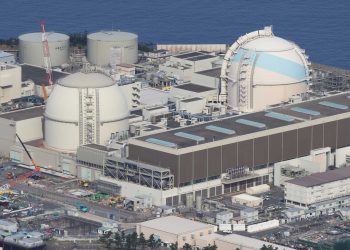,
Iran has vowed to start work immediately on drastically expanding its capacity to enrich uranium, defying the first ever UN sanctions against the Islamic republic's nuclear programme.
Top nuclear negotiator Ali Larijani said work would start as early as Sunday on installing 3,000 uranium enriching centrifuges at a key nuclear plant, hours after the UN Security Council unanimously adopted a resolution against Iran.
“Our immediate response to the UN Security Council is that, as of today, we will start the activities at the site of the 3,000 centrifuge machines in Natanz and we will go ahead with full speed,” Larijani said Sunday.
“We have said repeatedly that if the West wanted to exploit the UN Security Council it will not only have no influence but make us more determined to pursue our nuclear goals even faster,” he told the hardline Kayhan daily.
President Mahmoud Ahmadinejad, in a speech in Tehran, dismissed the UN resolution as just a “scrap of paper” and said the West would have to learn to live with Iran possessing nuclear technology.
“Whether the West likes it or not, Iran is a nuclear country and it is in their interests to live alongside Iran,” he said according to the semi-official Fars agency.
Installing 3,000 centrifuges would mark an important step for Iran towards an industrial scale enrichment of uranium, a process the West wants the Islamic republic to suspend as it can be used to make both fuel and nuclear bombs.
So far, Iran has two cascades of 164 centrifuges at the plant in Natanz in central Iran which it has used to enrich uranium on a research scale to levels high enough to make nuclear fuel.
Iran has maintained that it wants to have the 3,000 new centrifuges installed by March and Ahmadinejad has said the Islamic republic will be able to celebrate its “nuclearisation” around that time.
“We will accelerate our programme to install the 3,000 centrifuges” in response to the resolution, Alaeddin Boroujerdi, the influential head of parliament's security and foreign affairs committee, told state radio.
After weeks of diplomatic wrangling, the UN Security Council on Saturday adopted a resolution which imposes restrictions on Iran's nuclear industry and ballistic missile programme.
The United States accuses Iran of seeking to develop a nuclear weapon, charges vehemently denied by the Islamic republic which says it only wants to provide energy to a growing population.
The resolution warned that if Tehran refuses to comply with UN demands to freeze enrichment, the Council “shall adopt further appropriate measures under Article 41 of Chapter Seven” of the UN charter, a reference to non-military sanctions.
Russia's UN ambassador Vitaly Churkin, who worked hard in weeks of diplomatic horse-trading to soften the resolution, expressed hope that Iran “will respond constructively”.
US Under Secretary of State for Political Affairs Nicholas Burns however pledged to wrench up the pressure on Iran beyond the resolution.
“We don't think this resolution is enough in itself. We want the international community to take further action … We would like to see countries to stop doing business as usual with Iran,” the US diplomat said.
Meanwhile, foreign ministry spokesman Mohammad Ali Hosseini warned that Iran's cooperation with the Vienna-based UN nuclear watchdog could be reduced after the resolution.
“The resolution is contrary to legal principles. Therefore, it should not be expected that we will continue our work with the International Atomic Energy Agency at the same level,” he said.
“As the time passes will inform people about our decisions and it will be based on our national interest.”
Hosseini did not specify what cooperation could be cut, but some Iranian lawmakers have already warned that Tehran could limit UN inspections of its nuclear sites after the resolution.
The Iranian parliament agreed to urgently vote on a bill that would oblige the government to “revise” its cooperation with the UN nuclear watchdog.
Parliament agreed by an overwhelming majority to put in place a “procedure of urgency” to debate and vote on the bill, which means it goes straight to the top of its agenda and will be discussed in the next few days.
Hosseini also reaffirmed there was no chance Iran would now cede to Western demands for it to suspend uranium enrichment.
“We do not think that suspension is logical. They have passed resolutions like this many times before. This is a weak resolution and we do not think it went through legal procedures.”









